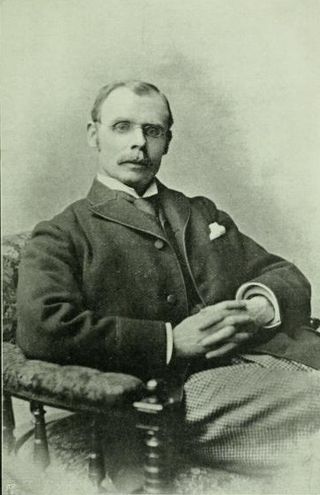Notes
- ↑ Black, George F. (1946) The Surnames of Scotland
Craigmyle is a surname. The surname is also sometimes spelt Craigmile, and is thought to come from the name-place in Kincardine O'Neil parish, Aberdeenshire. [1]
It may be a variation of Craigmillar [ citation needed ], a family who acquired lands south of Edinburgh from the monks of Dunfermline Abbey, who had received a land grant by King David I in the 12th century.
Baron Craigmyle is a title in the Peerage of the United Kingdom.
It may refer to:
Johnson is a surname of Anglo-Norman origin meaning "Son of John". It is the second most common in the United States. As a common family name in Scotland, Johnson is occasionally a variation of Johnston, a habitational name.
Souter is a Scottish surname derived from the Scots language term for a shoemaker. Notable people with the surname include:
Thomas Shaw is the name of:

Thomas Shaw, 1st Baron Craigmyle,, known as The Lord Shaw from 1909 to 1929, was a Scottish radical Liberal Party politician and judge.
Macfie or MacFie is a surname of Scottish origin. The name is derived from the Gaelic Mac Dhuibhshíthe, which means "son of Duibhshíth". This Gaelic personal name is composed of two elements: dubh "black" + síth "peace". The earliest record of the surname is of Thomas Macdoffy, in 1296.
Gow is a Scottish surname. The name is derived from the Gaelic gobha, meaning 'smith'. The name is represented in Scottish Gaelic as Gobha.
Considine is an Irish surname anglicised from the Gaelic form Mac Consaidín meaning "son of Consaidín" being derived from a foreign Christian name; meaning "son of Constantine". The family were based in Kingdom of Thomond, much of which later became County Clare. The ancestor of the family was Consaidín Ua Briain, a Bishop of Killaloe who died in 1194 and who was the son of Toirdhealbhach mac Diarmada Ua Briain. Notable people with the surname include:
Alexander Shaw may refer to:
The surname Monaghan is a family name originating from the province of Connacht in Ireland. Mostly a last name.
McElwain or McElwaine is a surname of Gaelic origin. It can be derived from either Scottish or Irish. The Scottish translation being the anglicized form of Gaelic Mac Gille Bheathain, meaning ‘son of the servant of (Saint) Beathan’ and also a personal name representing a diminutive of beatha ‘life’. The Irish form being the anglicised form of Gaelic Mac Giolla Bháin, meaning ‘son of the white-haired lad’. In Ulster this surname can be derived to be the Scottish form as opposed to the Irish form which would be more common in the Republic of Ireland. Another anglicised version of the Irish "Mac Giolla Bháin" is the surname Kilbane.
Soutar is a surname. It has Scottish origins. Notable people with the surname include:
O'Hea may refer to:
The surnames MacGavin and McGavin are Scottish surnames, which are possibly variations of the surnames McGowan and MacGowan, which are Anglicised forms of the Scottish Gaelic MacGobhann and Irish Gaelic Mac Gabhann, meaning "son of the smith". When the surname MacGavin and McGavin originate from Glasgow and Moray, they can be represented in Scottish Gaelic as Mac a' Ghobhainn.
Mac a' Ghobhainn is a Scottish Gaelic surname, meaning "son of the smith". The surname is used as a Scottish Gaelic form of several English-language surnames: MacGowan, and McGowan; and in Glasgow and Moray, the surnames MacGavin and McGavin. The feminine form of Mac a' Ghobhainn is Nic a' Ghobhainn.
Ferrier is a surname of European origin.

Bain or Bains is an English, French, Punjabi (Jatt), and Scottish surname. It may also be a variant form of a German surname.
McFetridge is a surname, anglicized form of Scottish Gaelic Mac Pheadruis, patronymic from a Gaelic form of the given name Peter. Notable people with the surname include:
The surname "Lyall" is found early in Scotland and was derived from the Old Norse given name "Liulfr", where "ulfr" means Wolf. After the Viking settlement in Scotland name sounds would have changed. For example, "Liulfr" is pronounced 'lee-oolv-ur', but after time probably softened in pronunciation to 'lee-ooler' and then 'loo-il' and finally 'lyall' after the Old Norse "R" was dropped off the end. The Lyall Clan is a Sept of Clan Sinclair a Highland Scottish clan of Norman origin a people descended from Norse Vikings who held lands in the north of Scotland, the Orkney Islands, and the Lothians.
Ó hAonghusa is the surname of at least two distinct Gaelic-Irish families. It is now anglicised as Hennessy and Hennessey.
The surname O'Loughlin is an Anglicised form of the Irish Ó Lochlainn meaning "descendant of Lochlann". According to historian C. Thomas Cairney, the O'Loughlins were a chiefly family of the Corco Modhruadh tribe who in turn came from the Erainn tribe who were the second wave of Celts to settle in Ireland from about 500 to 100 BC.